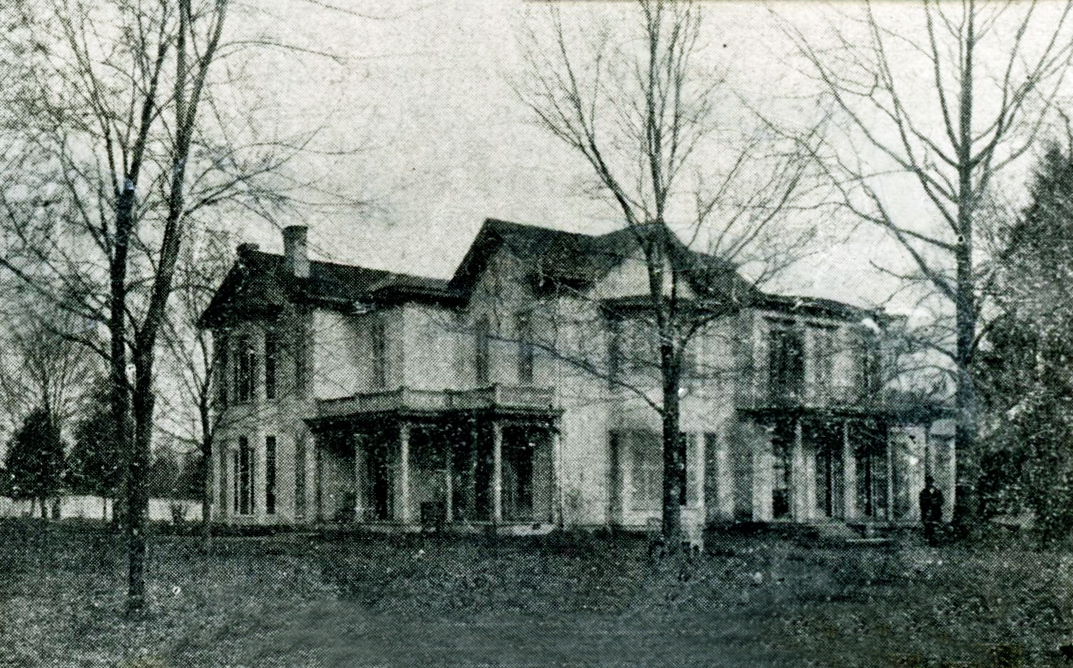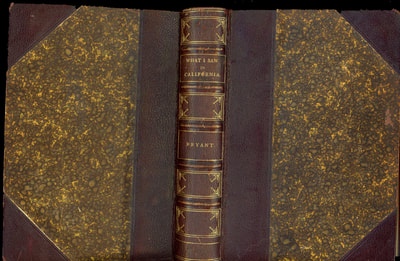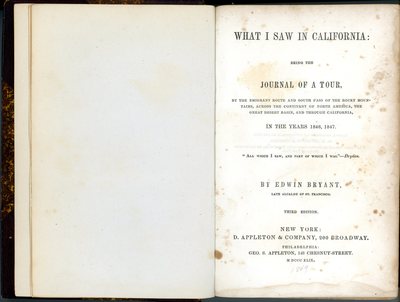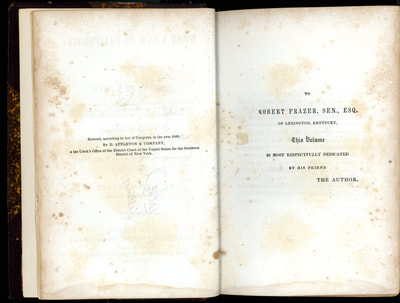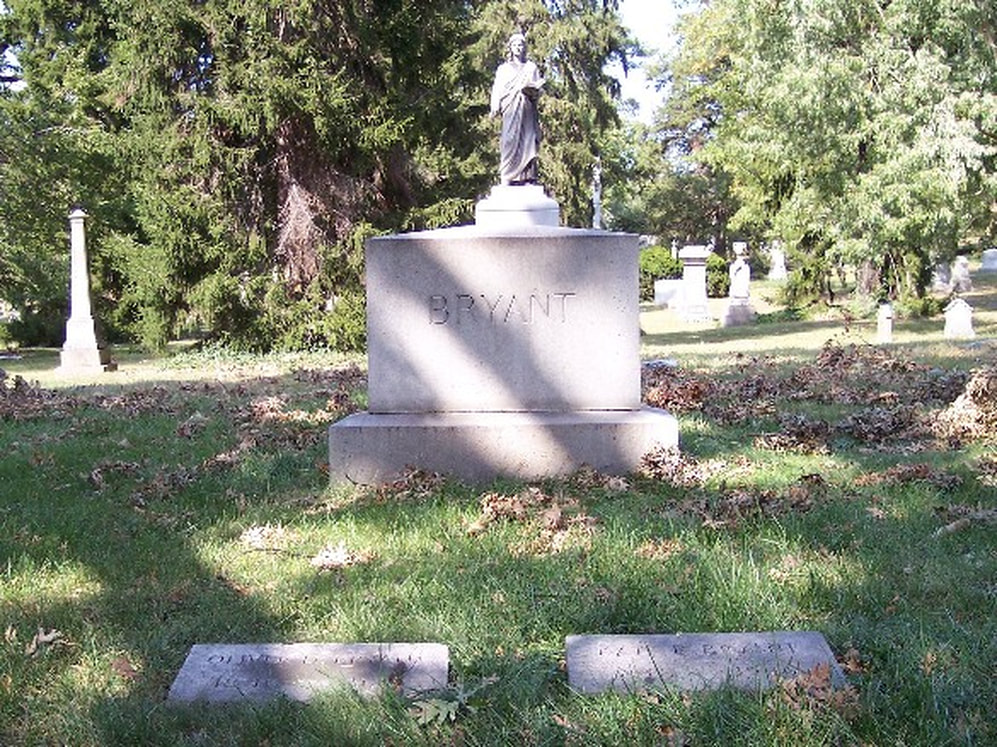Edwin Bryant (August 21, 1805-December 16, 1869)
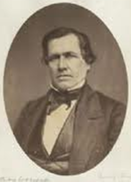 Edwin Bryant
Edwin Bryant
Edwin H. Bryant was born in 1805 in Pelham, Massachusetts. Already an established journalist – he had founded the Literary Cadet in Providence, RI and edited the New York Examiner in Rochester, NY – he arrived in Kentucky in December 1830 to ply his trade at the Louisville Journal with George D. Prentice. That relationship was destined to be short-lived, because the Journal couldn’t afford two editors. Within five months, Bryant moved to Lexington, where he helped establish the Lexington Observer, Kentucky Reporter and Lexington Intelligencer.
In 1844, he returned to Louisville to help Walter Haldeman with his fledgling paper, the Daily Dime (the forerunner of the Louisville Courier). Again, however, the relationship was short-lived. In poor health, he left Louisville on April 18, 1846 to head West for California’s more salubrious climes.
In Independence, Missouri, he met up with William H. Russell, and the two men joined a large wagon train that included the Donner Party. The Donners were following the route proposed in Lansford W. Hastings' Emigrants Guide to Oregon and California, which stated, "The most direct route, for the California emigrants, would be to leave the Oregon route, about two hundred miles east from Fort Hall; thence bearing west southwest, to the Salt Lake; and thence continuing down to the bay of San Francisco, by the route just described."
On June 27, the wagon train camped at Fort Bernard, where a mountain man named James Clyman warned the Donners to avoid the Hastings’ cutoff and stick to the main road. While the Donner party tragically decided not to heed Clyman’s advice, Bryant, Russell and seven other men did. The traded their wagons and horses for mules and reached Sutter’s Fort on September 1, 1846.
Bryant stayed in California until June 1847, venturing as far south as San Diego and returning to San Francisco, where he was appointed the second alcade (mayor) of the city by General Stephen W. Kearney. During the five months he served as alcade, Bryant arranged to sell 450 publicly-owned waterfront lots to private buyers. He purchased 14 for himself for $4,000 and sold them in 1849 for $100,000. Today, there is a street named for him in downtown San Francisco.
In 1844, he returned to Louisville to help Walter Haldeman with his fledgling paper, the Daily Dime (the forerunner of the Louisville Courier). Again, however, the relationship was short-lived. In poor health, he left Louisville on April 18, 1846 to head West for California’s more salubrious climes.
In Independence, Missouri, he met up with William H. Russell, and the two men joined a large wagon train that included the Donner Party. The Donners were following the route proposed in Lansford W. Hastings' Emigrants Guide to Oregon and California, which stated, "The most direct route, for the California emigrants, would be to leave the Oregon route, about two hundred miles east from Fort Hall; thence bearing west southwest, to the Salt Lake; and thence continuing down to the bay of San Francisco, by the route just described."
On June 27, the wagon train camped at Fort Bernard, where a mountain man named James Clyman warned the Donners to avoid the Hastings’ cutoff and stick to the main road. While the Donner party tragically decided not to heed Clyman’s advice, Bryant, Russell and seven other men did. The traded their wagons and horses for mules and reached Sutter’s Fort on September 1, 1846.
Bryant stayed in California until June 1847, venturing as far south as San Diego and returning to San Francisco, where he was appointed the second alcade (mayor) of the city by General Stephen W. Kearney. During the five months he served as alcade, Bryant arranged to sell 450 publicly-owned waterfront lots to private buyers. He purchased 14 for himself for $4,000 and sold them in 1849 for $100,000. Today, there is a street named for him in downtown San Francisco.
"What I Saw in California" at the Pewee Valley Museum
During his travels, he kept a journal, and after returning East with Gen. Kearny’s party, wrote a book entitled What I Saw in California, published by D. Appleton and Co. in early 1848. The book included a sensational account of the Donner Party, as well as valuable information about the route and necessary supplies and provisions. When gold was discovered in California, D. Appleton and Co. rushed to reprint the book, adding supplementary maps and information about the gold discovery and mines. The book became a best seller and was considered one of the most reliable overland guides available.
Bryant revisited California in 1849 and then returned to Kentucky to settle in Pewee Valley, where he lived at “Oak Lea” and “hosted many a gay party,” according to Smith’s “Land of the Little Colonel.” His California real estate investments, as well as royalties and speaking engagements from What I Saw in California, provided ample funds for a life of leisure. Antiquates Peeweeji places Bryant as the fourth to settle in the budding literary colony – after artist W.C. Allan, historian Ben Casseday and Casseday's father-in-law Virginia legislator, Congressman and Fifteenth Judicial Circuit Judge Benjamin Estill:
“…There was in those days a mighty traveler—One of those “pioneers of modern civilization”, as they are called by the barbarians without – who had founded a new empire upon the shores of the distant Pacific; who had led her serried hosts across the burning plains of America, to the gold bearing regions of the modern El Dorado, and who, despising the yellow dross he trod beneath his feet, contented himself with bringing the blessings of law and order; with possessing himself corner-lots and the affections of his people; till, from the revolution he effected there has grown an empire that, in no small degree, governs the world. Did he remain to be Emperor of the land he had won from the savage? Marius perished amid the ruins of Carthage; Columbus died requesting that the manacles, with which he had been dishonored, might be buried with him’ Pizaro was assassinated at the apex of his glory; but the Lord High Chancellor of Pewee (editor’s note: Edwin Bryant) lived to be one of the founders of the most glorious kingdom known to man; and still lives to bless it with his wisdom and to feed it from his larder…”
Bryant revisited California in 1849 and then returned to Kentucky to settle in Pewee Valley, where he lived at “Oak Lea” and “hosted many a gay party,” according to Smith’s “Land of the Little Colonel.” His California real estate investments, as well as royalties and speaking engagements from What I Saw in California, provided ample funds for a life of leisure. Antiquates Peeweeji places Bryant as the fourth to settle in the budding literary colony – after artist W.C. Allan, historian Ben Casseday and Casseday's father-in-law Virginia legislator, Congressman and Fifteenth Judicial Circuit Judge Benjamin Estill:
“…There was in those days a mighty traveler—One of those “pioneers of modern civilization”, as they are called by the barbarians without – who had founded a new empire upon the shores of the distant Pacific; who had led her serried hosts across the burning plains of America, to the gold bearing regions of the modern El Dorado, and who, despising the yellow dross he trod beneath his feet, contented himself with bringing the blessings of law and order; with possessing himself corner-lots and the affections of his people; till, from the revolution he effected there has grown an empire that, in no small degree, governs the world. Did he remain to be Emperor of the land he had won from the savage? Marius perished amid the ruins of Carthage; Columbus died requesting that the manacles, with which he had been dishonored, might be buried with him’ Pizaro was assassinated at the apex of his glory; but the Lord High Chancellor of Pewee (editor’s note: Edwin Bryant) lived to be one of the founders of the most glorious kingdom known to man; and still lives to bless it with his wisdom and to feed it from his larder…”
James Alexander Miller, who lived at Undulata before any of the settlers mentioned by Antiquitates Peeweji, corroborates that Bryant was fourth to arrive, but notes he came with Thomas Smith, who later lived at Woodside:
...Immediately upon (the Millers') removal to their new country home, which they named Maple Nook, frequent visitors from among their extended city friends were made during the following Summer to their hospitable home, which soon resulted in bringing other admirers & purchasers into the Valley.
The earliest of these were Prof. Noble Butler & family who purchased & improved the place now occupied by W.H. Dulaney.
Then W.N. Haldeman who for a time lived in Rollington but subsequently purchased & improved the grounds now known as the Craig place.
Next came Thomas Smith & family who purchased the place now occupied by Judge Muir. Judge Bryant was also a member of Mr. Smith's household. Mrs. Smith was a sister (editor's note: she was actually the niece) of Mrs. Henry Clay, & brought with her the three orphan children, whom she raised, of Henry Clay, Jr., Henry, Thomas & Nannette. The two boys were killed during the Rebellion. Nannette subsequently married Major H.C. McDowell of Louisville, & now own & occupy Ashland, the old homestead of Henry Clay near Lexington, Ky.
The two men would have met during their days as journalists in Lexington.
Oldham County tax records for the period just prior to the Civil War show that Edwin Bryant owned a single slave.
...Immediately upon (the Millers') removal to their new country home, which they named Maple Nook, frequent visitors from among their extended city friends were made during the following Summer to their hospitable home, which soon resulted in bringing other admirers & purchasers into the Valley.
The earliest of these were Prof. Noble Butler & family who purchased & improved the place now occupied by W.H. Dulaney.
Then W.N. Haldeman who for a time lived in Rollington but subsequently purchased & improved the grounds now known as the Craig place.
Next came Thomas Smith & family who purchased the place now occupied by Judge Muir. Judge Bryant was also a member of Mr. Smith's household. Mrs. Smith was a sister (editor's note: she was actually the niece) of Mrs. Henry Clay, & brought with her the three orphan children, whom she raised, of Henry Clay, Jr., Henry, Thomas & Nannette. The two boys were killed during the Rebellion. Nannette subsequently married Major H.C. McDowell of Louisville, & now own & occupy Ashland, the old homestead of Henry Clay near Lexington, Ky.
The two men would have met during their days as journalists in Lexington.
Oldham County tax records for the period just prior to the Civil War show that Edwin Bryant owned a single slave.
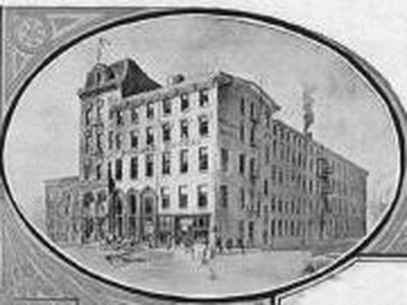 Bryant jumped to his death from the third floor of the Willard Hotel in Louisville.
Bryant jumped to his death from the third floor of the Willard Hotel in Louisville.
In 1869, Bryant made another brief visit to California, but after his return, committed suicide by jumping from a Louisville hotel window on December 16, 1869. The December 17, 1869 Courier-Journal carried the following story, which appears to have been written by George Prentice, about his “shocking” demise:
A SHOCKING DEATH
Fall of Judge Edwin Bryant from the Third Story of the Willard Hotel.
The city was shocked yesterday by the announcement of the sudden and terrible death of Judge Edwin Bryant. Judge B. lived in Pewee Valley, but, suffering from bad health came to the city about three weeks ago and placed himself under the treatment of his physician. He was staying at the Willard Hotel, and occupied room No. 31 on the third story. Yesterday morning about half-past six o’clock while his servant was absent from the room, and while, it is supposed, he was laboring under a fit of temporary insanity, he got out of his bed, and, opening the window, jumped out, falling to the pavement below, in the backyard, a distance of fifty or sixty feet. He was severely bruised internally by the fall, and lived no more than half an hour afterward.
Judge Bryant was sixty-two years of age. He was at one time editor of the Intelligencer, a prominent Whig paper in Lexington, Kentucky, and in 1835 became associated with Mr. Haldeman in the editorial management of the Louisville Courier, which position he relinquished, however, at the expiration of a year when he undertook a trip across the plains to California in company with Col. R. T. Jacob, Mr. Robert Ewing, Mr. E.A. Bryson and one or two other gentlemen. On his way across the plains the war with Mexico broke out, and after his arrival at San Francisco he was made an Alcade by General Kearney. Judiciously investing his funds to property in the city, it became very valuable, and gave him ample means during the remainder of his life to cultivate his literary tastes and devote himself to the hospitality for which he was noted, and which he accomplished so gracefully and liberally. Returning from California, he wrote and published “What I Saw in California,” a book which had a great run and large popularity. He purchased a residence in Pewee Valley about the year 1953, where he has ever since resided, with the exception of intervals spent in the city. The funeral will be taking place from Christ’s Church this afternoon. The notice will be found elsewhere.
The writer of this became intimately acquainted with Judge Bryant nearly forty years ago, the latter being editorially associated with him for a few months at this time. Judge B. manifested ready and striking ability in writing and in whatever he undertook. Notwithstanding his youth, he made his mark, strong, and broad, and deep, in the stormy politics of the period. He was alike vigorous and conscientious as an editor. He never, for the sake of achieving an advantage over an antagonist, said what he did not believe. All that he said and did was luminous with the soul of truth. He cared more for his honor than his own life. He combined all the highest qualities of manhood with the simplicity and earnestness of a child. His heart was a gushing fountain of kindness, gentility and affection. Its flowers were lovely and beautiful, nothing unpure lurking among them. The tendril of his love twined around every worthy thing within his reach. He was generous and even profuse in his benefactions. He never turned away from a petition for relief without lightening his own purse and the heart of the petitioner. Endowed with wealth, he freely gave of his abundance. To him it was indeed more blessed to give than to receive. He never forgot in prosperity a favor done him in adversity or neglected to render it back four-fold. It was ever his aim to do good, and he lost no opportunity doing it. He was one of the bravest of living men, but dangerous only to aggressors against himself or his friends or the community. He accepted the companionship only of the virtuous, the high-hearted and the true. No human being ever entertained a deeper scorn and loathing than he for the mean, the vile and the low, whether in men or in actions. He was perhaps too sensitive for this world; the chords of his may have been too finely attuned for the tough fingers of the demons of the storms of human life, but he has gone where only the airs of Eden will be breathed around him. If earthly congratulations may enter the paradise of God, accept ours, oh departed friend.
A SHOCKING DEATH
Fall of Judge Edwin Bryant from the Third Story of the Willard Hotel.
The city was shocked yesterday by the announcement of the sudden and terrible death of Judge Edwin Bryant. Judge B. lived in Pewee Valley, but, suffering from bad health came to the city about three weeks ago and placed himself under the treatment of his physician. He was staying at the Willard Hotel, and occupied room No. 31 on the third story. Yesterday morning about half-past six o’clock while his servant was absent from the room, and while, it is supposed, he was laboring under a fit of temporary insanity, he got out of his bed, and, opening the window, jumped out, falling to the pavement below, in the backyard, a distance of fifty or sixty feet. He was severely bruised internally by the fall, and lived no more than half an hour afterward.
Judge Bryant was sixty-two years of age. He was at one time editor of the Intelligencer, a prominent Whig paper in Lexington, Kentucky, and in 1835 became associated with Mr. Haldeman in the editorial management of the Louisville Courier, which position he relinquished, however, at the expiration of a year when he undertook a trip across the plains to California in company with Col. R. T. Jacob, Mr. Robert Ewing, Mr. E.A. Bryson and one or two other gentlemen. On his way across the plains the war with Mexico broke out, and after his arrival at San Francisco he was made an Alcade by General Kearney. Judiciously investing his funds to property in the city, it became very valuable, and gave him ample means during the remainder of his life to cultivate his literary tastes and devote himself to the hospitality for which he was noted, and which he accomplished so gracefully and liberally. Returning from California, he wrote and published “What I Saw in California,” a book which had a great run and large popularity. He purchased a residence in Pewee Valley about the year 1953, where he has ever since resided, with the exception of intervals spent in the city. The funeral will be taking place from Christ’s Church this afternoon. The notice will be found elsewhere.
The writer of this became intimately acquainted with Judge Bryant nearly forty years ago, the latter being editorially associated with him for a few months at this time. Judge B. manifested ready and striking ability in writing and in whatever he undertook. Notwithstanding his youth, he made his mark, strong, and broad, and deep, in the stormy politics of the period. He was alike vigorous and conscientious as an editor. He never, for the sake of achieving an advantage over an antagonist, said what he did not believe. All that he said and did was luminous with the soul of truth. He cared more for his honor than his own life. He combined all the highest qualities of manhood with the simplicity and earnestness of a child. His heart was a gushing fountain of kindness, gentility and affection. Its flowers were lovely and beautiful, nothing unpure lurking among them. The tendril of his love twined around every worthy thing within his reach. He was generous and even profuse in his benefactions. He never turned away from a petition for relief without lightening his own purse and the heart of the petitioner. Endowed with wealth, he freely gave of his abundance. To him it was indeed more blessed to give than to receive. He never forgot in prosperity a favor done him in adversity or neglected to render it back four-fold. It was ever his aim to do good, and he lost no opportunity doing it. He was one of the bravest of living men, but dangerous only to aggressors against himself or his friends or the community. He accepted the companionship only of the virtuous, the high-hearted and the true. No human being ever entertained a deeper scorn and loathing than he for the mean, the vile and the low, whether in men or in actions. He was perhaps too sensitive for this world; the chords of his may have been too finely attuned for the tough fingers of the demons of the storms of human life, but he has gone where only the airs of Eden will be breathed around him. If earthly congratulations may enter the paradise of God, accept ours, oh departed friend.
After the funeral service, his body spent 12 years in the public receiving vault at Cave Hill Cemetery until it was finally buried. A nephew and brother-in-law had his body exhumed in 1888 and reburied in the Bryant family plot in Cincinnati’s Spring Grove Cemetery, where he rests without an individual marker.
Bryant’s will was written on October 13, 1869, several months before he committed suicide and a codicil was added a few weeks later. The will is on file at Metro Hall in downtown Louisville and reads as follows:
Bryant’s will was written on October 13, 1869, several months before he committed suicide and a codicil was added a few weeks later. The will is on file at Metro Hall in downtown Louisville and reads as follows:
Louisville, Ky Oct. 13, 1869
Being of sound mind and body and fully conscious of my affairs I hereby revoke all wills I have heretofore made and dictate this to be my last will and testament. First I do hereby will and bequeath to Mrs. Nanette B. Smith the sum of five thousand dollars. Second, I do also give and bequeath to Mrs. Nanette Smith the sum of five thousand dollars. Thirdly, after my just debts are paid, I give and bequeath to my lawful heirs all the remainder of my fair property and to carry out my wishes. I hereby appoint Ira P. ? to be my executor to carry out the above will and that he not be bound to give any security for the trust. Witness my hand this day above written.
Edwin Bryant
Louisville, Ky. November 1, 1869
I hereby add to this as a codicil to my will above written. I also give and bequeath to E? M? and to Nanny McDowell (Editor's note: She was Nanette B. Smith’s orphaned cousin once removed by her cousin Henry Clay, Jr.) each one thousand dollars and in all other respects confirm my will as above written as witness my hand.
Edwin Bryant
Being of sound mind and body and fully conscious of my affairs I hereby revoke all wills I have heretofore made and dictate this to be my last will and testament. First I do hereby will and bequeath to Mrs. Nanette B. Smith the sum of five thousand dollars. Second, I do also give and bequeath to Mrs. Nanette Smith the sum of five thousand dollars. Thirdly, after my just debts are paid, I give and bequeath to my lawful heirs all the remainder of my fair property and to carry out my wishes. I hereby appoint Ira P. ? to be my executor to carry out the above will and that he not be bound to give any security for the trust. Witness my hand this day above written.
Edwin Bryant
Louisville, Ky. November 1, 1869
I hereby add to this as a codicil to my will above written. I also give and bequeath to E? M? and to Nanny McDowell (Editor's note: She was Nanette B. Smith’s orphaned cousin once removed by her cousin Henry Clay, Jr.) each one thousand dollars and in all other respects confirm my will as above written as witness my hand.
Edwin Bryant
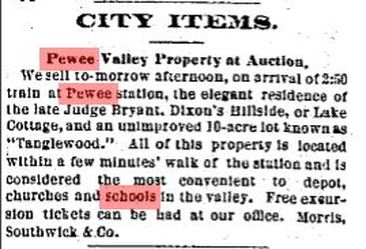 June 23, 1870 Courier-Journal
June 23, 1870 Courier-Journal
On June 23, 1870, Morris, Southwick & Co. placed a classified ad in the Courier-Journal to promote the auction of Bryant's Pewee Valley estate. It included not only "Dixon's Hillside, or Lake Cottage" -- other names for Oaklea -- but an "unimproved 10-acre lot known as 'Tanglewood.'" That lot is shown on the 1879 Beers & Lanagan Atlas and was adjacent to what is now known as the Tanglewood estate.
Oaklea was purchased by the minister at St. James Episcopal Church, Rev. George D. Cummins, who turned around and sold the 18-acre estate to Judge Peter B. Muir later the same year.
Oaklea was purchased by the minister at St. James Episcopal Church, Rev. George D. Cummins, who turned around and sold the 18-acre estate to Judge Peter B. Muir later the same year.
Related Links:

